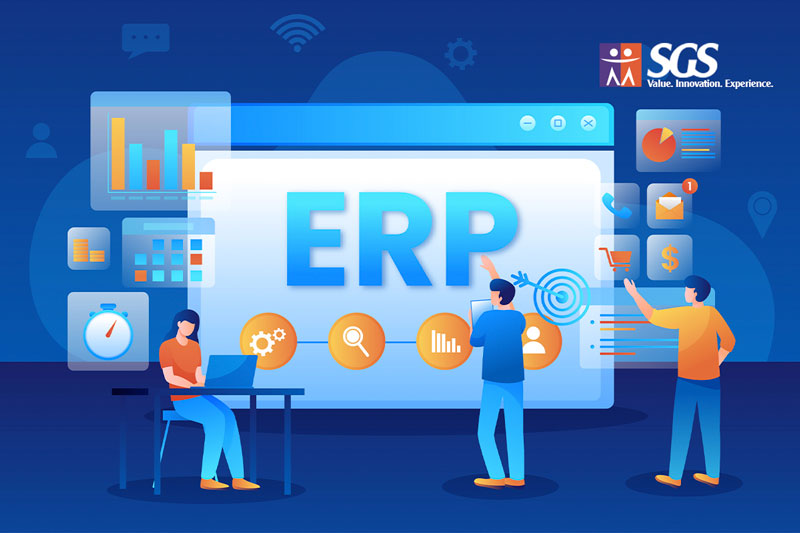In the fast-paced digital age, businesses of all sizes are recognizing the need for efficient and integrated systems to manage their operations. Enterprise Resource Planning (ERP) software has emerged as a crucial tool to streamline processes, enhance collaboration, and drive growth. However, selecting the right ERP solution can be a daunting task, considering the myriad of options available in the market. In this article, we will delve into the topmost important factors to consider when choosing an ERP system to ensure a successful implementation.
BUSINESS NEEDS ASSESSMENT
Before embarking on an ERP selection journey, it's imperative to conduct a thorough assessment of your business needs and objectives. Understand your organization's pain points, challenges, and growth aspirations. Identify specific areas where an ERP can bring tangible benefits, such as finance, inventory management, human resources, and customer relationship management. When selecting an ERP solution for your business, it's crucial to take into account the following essential criteria:
1. Scalability and Flexibility
As your business grows, so will its demands. Your chosen ERP solution should be scalable to accommodate the increasing volume of data and users without compromising performance. Additionally, flexibility is crucial, allowing you to customize the ERP to align with your unique business processes while still being able to adapt to future changes.
2. Industry Fit
Each industry has its own set of requirements and regulations. It's vital that the ERP system you choose caters to the specific needs of your industry. A specialized industry-focused ERP will include features and functionalities that are tailored to your sector, reducing the need for extensive customization.
3. Integration Capabilities
An ERP system should act as a central hub, seamlessly connecting different departments and functions. Check if the ERP can integrate with your existing software applications, such as CRM, accounting, e-commerce platforms, and more. Integration streamlines data flow, reduces data entry errors, and provides a comprehensive view of your business operations.
4. User-Friendly Interface and Training
The success of an ERP system largely depends on its adoption by users. A user-friendly interface and intuitive navigation are essential to minimize the learning curve and encourage employee engagement. Additionally, ensure that the ERP vendor offers comprehensive training and support to empower your team to make the most of the software.
5. Vendor Reputation and Support
Choosing a reputable ERP vendor is crucial to the success of your implementation. Research the vendor's track record, customer reviews, and industry reputation. A reliable vendor will not only provide a robust ERP solution but also offer ongoing support, updates, and assistance to address any issues that arise.
6. Cloud vs. On-Premises Deployment
Decide whether a cloud-based or on-premises deployment suits your organization's needs better. Cloud-based ERP solutions offer flexibility, accessibility, and reduced IT infrastructure costs, while on-premises solutions offer more control over data and customization. Consider factors like data security, cost, and your organization's IT capabilities.
7. Data Security and Compliance
Protecting sensitive business data is non-negotiable. Your chosen ERP solution should adhere to industry standards and regulations concerning data security and compliance, such as GDPR, HIPAA, or industry-specific requirements. Robust encryption, authentication protocols, and regular security updates are essential features to look for.
8. Total Cost of Ownership (TCO)
An ERP implementation involves more than just the upfront software costs. Consider the entire cost of ownership, including licensing fees, implementation expenses, training costs, ongoing support, and potential customization. Compare the TCO of different ERP solutions to make an informed decision.
9. Mobile Accessibility
In a world where remote work and mobile devices are the norm, mobile accessibility is a key consideration. Ensure that the ERP system you choose provides a mobile app or responsive web interface that allows users to access critical information and perform tasks on the go.
10. Analytics and Reporting
Data-driven decision-making is crucial for businesses to thrive. An effective ERP system should offer robust analytics and reporting capabilities. Look for features that allow you to generate real-time reports, visualize data trends, and gain insights that help you make informed strategic decisions.
11. Ease of Upgrades
Technology evolves rapidly, and your ERP system should be able to keep up. Consider how seamless the upgrade process is with your chosen ERP vendor. Regular updates and upgrades ensure that your software remains up-to-date with the latest features, security enhancements, and bug fixes.
Selecting the right ERP system for your business is a critical decision that can significantly impact your efficiency and growth. By carefully evaluating your business needs, considering scalability, integration capabilities, user-friendliness, vendor reputation, security, and other key factors, you can ensure a successful ERP implementation that empowers your organization for years to come.
At SGS Technologie, we understand the intricacies of ERP selection and implementation, and we're here to guide you through the process of finding the perfect ERP solution that aligns with your unique business goals. Contact us today to embark on your ERP journey toward enhanced efficiency and growth.

<script type="application/ld+json">
{
"@context": "http://schema.org",
"@type": "Article",
"name": "Essential Criteria to Consider When Selecting an ERP Solution for Your Business",
"author": {
"@type": "Person",
"name": "majestic"
},
"image": "https://www.sgstechnologies.net/sites/default/files/2023-08/erp-blogimage_1.jpg",
"articleSection": "In the fast-paced digital age, businesses of all sizes are recognizing the need for efficient and integrated systems to manage their operations. Enterprise Resource Planning (ERP) software has emerged as a crucial tool to streamline processes, enhance collaboration, and drive growth.",
"articleBody": "However, selecting the right ERP solution can be a daunting task, considering the myriad of options available in the market. In this article, we will delve into the topmost important factors to consider when choosing an ERP system to ensure a successful implementation.</P>\n\n<H4>BUSINESS NEEDS ASSESSMENT</H4>\n\n<P>Before embarking on an ERP selection journey, it's imperative to conduct a thorough assessment of your business needs and objectives. Understand your organization's pain points, challenges, and growth aspirations. Identify specific areas where an ERP can bring tangible benefits, such as finance, inventory management, human resources, and customer relationship management. When selecting an ERP solution for your business, it's crucial to take into account the following essential criteria:</P>\n\n<P><STRONG>1. Scalability and Flexibility</STRONG></P>\n\n<P>As your business grows, so will its demands. Your chosen ERP solution should be scalable to accommodate the increasing volume of data and users without compromising performance. Additionally, flexibility is crucial, allowing you to customize the ERP to align with your unique business processes while still being able to adapt to future changes.</P>\n\n<P><STRONG>2. Industry Fit</STRONG></P>\n\n<P>Each industry has its own set of requirements and regulations. It's vital that the ERP system you choose caters to the specific needs of your industry. A specialized industry-focused ERP will include features and functionalities that are tailored to your sector, reducing the need for extensive customization.</P>\n\n<P><STRONG>3. Integration Capabilities</STRONG></P>\n\n<P>An ERP system should act as a central hub, seamlessly connecting different departments and functions. Check if the ERP can integrate with your existing software applications, such as CRM, accounting, e-commerce platforms, and more. Integration streamlines data flow, reduces data entry errors, and provides a comprehensive view of your business operations.</P>\n\n<P><STRONG>4. User-Friendly Interface and Training</STRONG></P>\n\n<P>The success of an ERP system largely depends on its adoption by users. A user-friendly interface and intuitive navigation are essential to minimize the learning curve and encourage employee engagement. Additionally, ensure that the ERP vendor offers comprehensive training and support to empower your team to make the most of the software.</P>\n\n<P><STRONG>5. Vendor Reputation and Support</STRONG></P>\n\n<P>Choosing a reputable ERP vendor is crucial to the success of your implementation. Research the vendor's track record, customer reviews, and industry reputation. A reliable vendor will not only provide a robust ERP solution but also offer ongoing support, updates, and assistance to address any issues that arise.</P>\n\n<P><STRONG>6. Cloud vs. On-Premises Deployment</STRONG></P>\n\n<P>Decide whether a cloud-based or on-premises deployment suits your organization's needs better. Cloud-based ERP solutions offer flexibility, accessibility, and reduced IT infrastructure costs, while on-premises solutions offer more control over data and customization. Consider factors like data security, cost, and your organization's IT capabilities.</P>\n\n<P><STRONG>7. Data Security and Compliance</STRONG></P>\n\n<P>Protecting sensitive business data is non-negotiable. Your chosen ERP solution should adhere to industry standards and regulations concerning data security and compliance, such as GDPR, HIPAA, or industry-specific requirements. Robust encryption, authentication protocols, and regular security updates are essential features to look for.</P>\n\n<P><STRONG>8. Total Cost of Ownership (TCO)</STRONG></P>\n\n<P>An ERP implementation involves more than just the upfront software costs. Consider the entire cost of ownership, including licensing fees, implementation expenses, training costs, ongoing support, and potential customization. Compare the TCO of different ERP solutions to make an informed decision.</P>\n\n<P><STRONG>9. Mobile Accessibility</STRONG></P>\n\n<P>In a world where remote work and mobile devices are the norm, mobile accessibility is a key consideration. Ensure that the ERP system you choose provides a mobile app or responsive web interface that allows users to access critical information and perform tasks on the go.</P>\n\n<P><STRONG>10. Analytics and Reporting</STRONG></P>\n\n<P>Data-driven decision-making is crucial for businesses to thrive. An effective ERP system should offer robust analytics and reporting capabilities. Look for features that allow you to generate real-time reports, visualize data trends, and gain insights that help you make informed strategic decisions.</P>\n\n<P><STRONG>11. Ease of Upgrades</STRONG></P>\n\n<P>Technology evolves rapidly, and your ERP system should be able to keep up. Consider how seamless the upgrade process is with your chosen ERP vendor. Regular updates and upgrades ensure that your software remains up-to-date with the latest features, security enhancements, and bug fixes.</P>\n\n<P>Selecting the right ERP system for your business is a critical decision that can significantly impact your efficiency and growth. By carefully evaluating your business needs, considering scalability, integration capabilities, user-friendliness, vendor reputation, security, and other key factors, you can ensure a successful ERP implementation that empowers your organization for years to come.</P>\n\n<P>At <A href=\"https://www.sgstechnologies.net/contact\">SGS Technologie</A>, we understand the intricacies of ERP selection and implementation, and we're here to guide you through the process of finding the perfect ERP solution that aligns with your unique business goals. Contact us today to embark on your ERP journey toward enhanced efficiency and growth",
"url": "https://www.sgstechnologies.net/blog/Essential-Criteria-to-Consider-When-Selecting-an-ERP-Solution-for-Your-Business",
"publisher": {
"@type": "Organization",
"name": "SGS"
}
}
</script>










